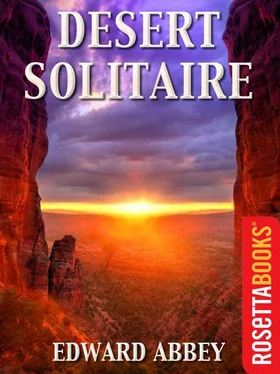Abbey, Edward - Desert Solitaire (Edward Abbey Series )
Здесь есть возможность читать онлайн «Abbey, Edward - Desert Solitaire (Edward Abbey Series )» — ознакомительный отрывок электронной книги совершенно бесплатно, а после прочтения отрывка купить полную версию. В некоторых случаях можно слушать аудио, скачать через торрент в формате fb2 и присутствует краткое содержание. Год выпуска: 2011, Издательство: RosettaBooks, Жанр: Старинная литература, на английском языке. Описание произведения, (предисловие) а так же отзывы посетителей доступны на портале библиотеки ЛибКат.
- Название:Desert Solitaire (Edward Abbey Series )
- Автор:
- Издательство:RosettaBooks
- Жанр:
- Год:2011
- ISBN:нет данных
- Рейтинг книги:4 / 5. Голосов: 1
-
Избранное:Добавить в избранное
- Отзывы:
-
Ваша оценка:
- 80
- 1
- 2
- 3
- 4
- 5
Desert Solitaire (Edward Abbey Series ): краткое содержание, описание и аннотация
Предлагаем к чтению аннотацию, описание, краткое содержание или предисловие (зависит от того, что написал сам автор книги «Desert Solitaire (Edward Abbey Series )»). Если вы не нашли необходимую информацию о книге — напишите в комментариях, мы постараемся отыскать её.
Desert Solitaire (Edward Abbey Series ) — читать онлайн ознакомительный отрывок
Ниже представлен текст книги, разбитый по страницам. Система сохранения места последней прочитанной страницы, позволяет с удобством читать онлайн бесплатно книгу «Desert Solitaire (Edward Abbey Series )», без необходимости каждый раз заново искать на чём Вы остановились. Поставьте закладку, и сможете в любой момент перейти на страницу, на которой закончили чтение.
Интервал:
Закладка:
Among the visitors on this last big weekend are many Moabites and other native Utahns: the Mormons, the Latter-Day Saints. Some of my liberalized friends regard the LDS with disdain; they see in the Church only a bastion of sectarian foolishness and political reaction and in its adherents a voting bloc of Know-Nothings, racially prejudiced, religiously bigoted, opposed alike to the graduated income tax, the United Nations, urban renewal, foreign aid, legislative reapportionment, public welfare, Medicare and even free lunches for schoolchildren—actually or potentially a rabble of John Birchers.
What can you expect, they ask, of a sect which gave Utah a governor like J. Bracken Lee and Eisenhower a secretary of agriculture like Ezra T. Benson? Which denies full church membership to Negroes because they are believed to be the outcast sons of Ham? Whose patron saint was an angel called Moroni? Whose founding father Joseph Smith claimed to have carried about under his arms solid gold tablets which, if they were the size he said they were (no one else ever saw them), would have weighed about half a ton? (Gold a very heavy metal, specific gravity 19.3.) Whose official newspaper The Deseret News solemnly proclaims on its masthead “We believe that the Constitution of the United States was Divinely Inspired” but fails to explain why the Almighty changed His mind on the Eighteenth Amendment?
One can grant the accuracy of these charges without conceding that the Mormon religion is any more whimsical on points of doctrine than most other sects—the Baptists, for example, with their insistence on total immersion as a prerequisite to the salvation of the soul: All Christians must be totally immersed. (In what or for how long not being clearly specified.) Or the Jews, with their prepuce-collecting Yahweh, who created light on the first day and several days later, apparently as an afterthought, created the sun: “Six days He labored; on the seventh He was arrested.” Or the Roman Catholics, with their dogmatic assertion of the physical Assumption of the Virgin Mary—launching her on a flat trajectory into outer space, like a shot off a shovel, without even a crash helmet or a pressure suit. Or the Hindus, with their sanctified ritual for nasal emunction: only one nostril may be discharged at a time, etc. Or the small-town atheist for that matter, with his Little Blue Books and sneering jokes against ancient and venerable institutions.
Leaving aside the comical aspects of their creed, one can argue that the Mormons in practice achieved a way of life in which there was much to admire, much worth saving. In addition to their pioneering migrations, full of unusual heroism and examples of fortitude (e.g., Brigham Young and his seventeen wives), the Mormons deserve respect for settling the most rugged, difficult as well as spectacular, terrain in the West. What was unusual, however, was their communitarian approach to the problems of settlement in an inhospitable environment. Their emphasis on mutual aid, cooperation and sharing was not unknown among other American communities—and indeed such qualities are vital to survival in a frontier situation—but the Mormons went about it in a far more deliberate, conscious manner, with more successful results. For example, in settling a given area they did not scatter themselves abroad over the landscape in isolated farms and ranches, each man for himself and the devil take the hindmost, but rather built small, rational, beautiful and durable towns in which all could live together, centered about the Church, which served not only as a religious center but also as a social and political focal point for the community (in this respect harking back to the model of New England). Irrigation systems were then built with the cooperative labor of all, the irrigable land divided fairly among the member families, and the back country—canyon and mesa—left open to all who might wish to engage in cattle raising, as well as farming. And nearly all did, (This formed the “open range” until the advent of large-scale fencing and the Taylor Grazing Act closed it off to all but an established few.) Each community, through the Church, also set up what we may call a public welfare service to provide sufficient and generous aid to those brought down by accident, illness, bad luck or other misfortune. In sum, the Mormons built coherent, self-sustaining communities with a vigorous common life in which all could participate, free of any great disparities in wealth, small enough to make each member important. There was even room for the dissenter and nonconformist—every town had a few jack-Mormons, those who smoked tobacco, drank tea or coffee or hard liquor, and perhaps even joined the Democratic Party.
Subsequently swamped by the new American mode, by industrialism, commercialism, urbanism, rugged and ragged individualism, the old Mormon communities are now disappearing. But in such small towns as Moab, Kanab, Boulder and Escalante we can still see the handsome homes of hand-carved sandstone blocks, the quiet streets lined with irrigation ditches and giant cottonwoods, the gardens and irrigated pastures, the children riding their horses, which remind us on the downhill side of the twentieth century of what life must have been like back in the nineteenth. On its gentle side, that is.
As for the people themselves, at least those whom I have come to know in and around Moab, they are generally very conservative in their political opinions, yes, and old-fashioned in their morality, but despite this or because of it have the usual virtues of country people: are friendly, hospitable, honest, self-reliant and self-confident. Not very interesting, perhaps, but good to know, good to have as friends and neighbors. Capable of taking care of themselves, and with the means to do it, it is not surprising that they question the justice of being taxed by the Federal Government in order to help support the teeming proletariat (literally and etymologically “the reproducers”) of cities which to some of these independent people seem as remote and foreign as Calcutta or Cairo.
All of this is now under change, of course, and in the accelerating process of urbanization the Mormons of Utah are already discovering their interdependence with the rest of the nation and with the world. Certainly in Salt Lake City itself there is no lack of intriguing social problems—air pollution, traffic jams, angry adolescents, babies born from sinlock and all the rest of it—and very soon the Latter-Day Saints will be forced to confront directly the symptoms of discontent and desperation with which most Americans are now familiar: from LDS to LSD. Even unto the Land of Moab.
In the meanwhile the desert people persist in some of their quaint and antiquated ways. Leslie McKee’s wife, a sweet and kindly woman and a pillar of the Church, tells me that she has unilaterally bound my soul to hers, in accordance with the teaching of her faith, which has provided this unusual technique for the salvation of souls which otherwise would obviously be lost and shoveled into Hell. This binding means, if I understand her rightly, that when she goes to Heaven my soul likewise will be dragged along like the tail of a kite, with or without my consent. And suppose she goes to Hell? She assures me that this cannot happen, that she has already been saved and the place reserved—for both of us. But I am not entirely set at ease; something might go wrong. Furthermore she is a generation older than I—what about the time factor? Is my soul to be prematurely and summarily unhouseled in its prime, if as seems likely her demise precedes mine by some twenty or thirty years? On this point she is uncomfortably vague. Perhaps it is all a sinister scheme to rid the world of the pagan Gentile without incurring suspicion.
However, it’s too late now. Like it or not I am on my way:
Читать дальшеИнтервал:
Закладка:
Похожие книги на «Desert Solitaire (Edward Abbey Series )»
Представляем Вашему вниманию похожие книги на «Desert Solitaire (Edward Abbey Series )» списком для выбора. Мы отобрали схожую по названию и смыслу литературу в надежде предоставить читателям больше вариантов отыскать новые, интересные, ещё непрочитанные произведения.
Обсуждение, отзывы о книге «Desert Solitaire (Edward Abbey Series )» и просто собственные мнения читателей. Оставьте ваши комментарии, напишите, что Вы думаете о произведении, его смысле или главных героях. Укажите что конкретно понравилось, а что нет, и почему Вы так считаете.












